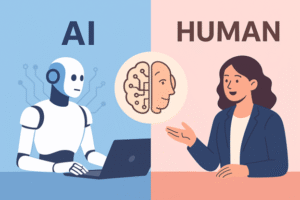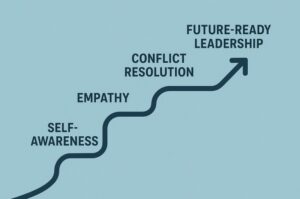
A few years ago, the Carnegie Institute reported that 85% of job success comes from well developed people skills and not technical knowledge.
Fast forward to today,and this insight feels almost prophetic.
Artificial Intelligence is already handling the technical aspects like automating reports,crunching data and even writing codes. But here is the paradox while AI is rising, employee turnover is too.
In the age of AI, emotional intelligence(EQ) is no longer a soft skill. It’s the hard currency that decides who stays, who leads and who thrives.
Why People Leave

We have all heard the phrase, “People don’t quit companies,they quit managers”
Data proves it.
Gallup’s 2023 research found that 70% of the variance in team management is driven by the manager. So the number one reason employees resign is not salary but instead it is lack of recognition,empathy and genuine connection.
A leader who lacks EQ will also fail to listen, miss emotional cues and will eventually struggle to navigate conflict successfully. The result? Disengaged employees who silently disconnect before walking out the door. In contrast emotionally intelligent managers create trust and communicate clearly and recognise contributions, small shifts that dramatically impact retention.
Why AI Makes EQ Non Negotiable

Here’s the truth, AI is better than us at technical precision. It can analyze faster, automate smoother and predict smarter than us. But there’s a limit to it. AI can’t replace empathy, inspiration and trust. It doesn’t read the room or can manage conflict and motivate a struggling employee to try again.
That’s why the World Economic Forum’s Future of Jobs Report (2023) lists Emotional Intelligence as one of the Top 10 Skills of the future.
In a world where technical tasks are outsourced to algorithms, EQ becomes the ultimate differentiator.
Let’s think about it for a minute, shall we? Would you stay in a team that knows every Excel shortcut but can not handle a tense meeting? Or would you choose a leader that listens and motivates?
Your answer will prove why EQ will define career resilience in the age of AI.
EQ As a Retention Strategy
Organisations that invest in EQ don’t just build better leaders they build loyalty.
*Johnson & Johnson tracked leaders who completed EQ training and foun their divisions delivered 20% more profit than those led by low EQ managers.
*A PsicoSmart 2022 study showed companies focusing on emotional intelligence saw 40% lower turnover rates.
*Employees in high EQ cultures report 25% higher job satisfaction.
Hence, the message is clear
EQ is not just good for culture its a retention and performance strategy with measurable ROI.
Building Future Ready Corporates

The best news?Emotional intelligence isn’t fixed, it can be learnt, practised and strengthened.
Corporates looking to future proof their leadership pipelines should integrate EQ into every stage of development.
Practical starting points include:
- Self awareness audits: Encourage leaders to regularly reflect and seek 360 degree feedback.
- Empathy mapping: Training managers to step into employees perspective during decision making.
- Conflict coaching: Equipping leaders to de-escalate tension and turn disagreements into solutions.
By embedding EQ into leadership development and AI upskilling, organisations ensure that while technology handles efficiency, leaders handle humanity.
The Bottom Line
AI is here to stay. But the future of work won’t be defined by the smartest machines, it will be defined by the most emotionally intelligent leaders.
The companies that thrive will be those that balance tech driven efficiency with human driven connection.
If organisations want to retain talent, inspire loyalty while also staying competitive then they must invest as much in EI as they do in AI.
Because in the age of machines it’s the human skill of empathy that will keep people from walking out the door.





Leave a Reply